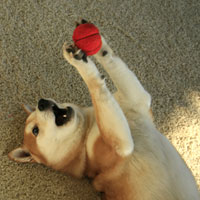 HOME: Where they keep the kibble. The origin and the terminus of the walk. At home, all scents are known.
HOME: Where they keep the kibble. The origin and the terminus of the walk. At home, all scents are known.
CYBERSPACE: The place where people go while dogs are sleeping.
CONQUEST: It is not enough to give chase to a ball, catch it in mid-air and bring it back for another throw. A victory lap is in order. Then give it a good shake to make sure it knows it has been conquered.
CONTINGENCY: If an orange ball has just been lost, look around. Maybe there’s a busted tennis ball nearby. Maybe there’s a stick waiting to be found.
PHENOMENOLOGY: When wind happens it happens in the ears. When rain happens all the smells are hidden. When thunder happens it happens inside the heart and head and there is no hiding from the fear.
CONSUMPTION: If it is put in front of you, eat it. If it is on the floor, eat it. If it is on the ground, eat it. If it is dead, sniff it carefully, and then eat it. Even if it smells like shit, eat it. Even if it is shit, eat that too.
SECURITY: Bark if the doorbell rings. Everyone knows danger rings before it enters.
WORK: The ball is a bird, see? Shake it, make sure it’s dead. The sticks need rounding up. Who left this branch here?
PERFORMANCE: If you bring them the ball they will throw it. If you stare at the door they will open it. If you come when you are called, you will usually get something out of it. If you lose a ball under the couch they will find it for you.
MELANCHOLIA: When playtime is over and the long nap in the dark is over, and the early morning walk is over, sometimes in a hurry, sometimes even in the rain, the people shut the door behind them and the dog is left.
Excerpted from J.R. Carpenter, Words the Dog Knows

 J. R. Carpenter’s long-awaited first novel Words the Dog Knows follows the crisscrossing paths of a quirky cast of characters through the Mile End neighbourhood of Montreal. Simone couldn’t wait to get out of rural Nova Scotia. In Montreal she buries her head in books about far off places.
J. R. Carpenter’s long-awaited first novel Words the Dog Knows follows the crisscrossing paths of a quirky cast of characters through the Mile End neighbourhood of Montreal. Simone couldn’t wait to get out of rural Nova Scotia. In Montreal she buries her head in books about far off places.